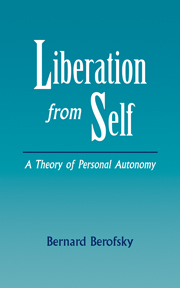Book contents
- Frontmatter
- Contents
- Liberation from self
- 1 Introduction
- 2 Freedom and autonomy
- 3 Freedom of action
- 4 Agent freedom
- 5 Values and the self
- 6 Autonomy and rationality
- 7 Rationality, values, and integrity
- 8 The liberation theory of autonomy: Objectivity
- 9 The liberation theory of autonomy: The place of self
- 10 The value of autonomy
- Notes
- Bibliography
- Index
4 - Agent freedom
Published online by Cambridge University Press: 16 September 2009
- Frontmatter
- Contents
- Liberation from self
- 1 Introduction
- 2 Freedom and autonomy
- 3 Freedom of action
- 4 Agent freedom
- 5 Values and the self
- 6 Autonomy and rationality
- 7 Rationality, values, and integrity
- 8 The liberation theory of autonomy: Objectivity
- 9 The liberation theory of autonomy: The place of self
- 10 The value of autonomy
- Notes
- Bibliography
- Index
Summary
Advocates of valuational freedom are reacting against the idea that ascriptions of freedom to a human being are just ascriptions of the capacity to engage in unfettered or unimpeded activity or the absence of sufficient causes. Freedom has a moral as well as a metaphysical dimension. If we ignore the former, there would be no difference between the freedom of a human agent and the freedom of a fly or an electron. Freedom is that state which enables its bearer to be guided through life by values; it permits the agent to embody in action moral and nonmoral values, thereby sanctioning third party judgments of the agent's worth and responsibility for those actions. Although the absence of impediments or the availability of adequate opportunity may be a necessary condition for any being to achieve this state, there are also conditions internal to the agent, including those which set creatures with values apart from others. Although I upheld the centrality of a nonvaluational conception of freedom of action in the last chapter, we will have to look more closely at the claims made on behalf of this normative component for the case of free agency.
This project – the definition of free agency – is complicated by the fact that the same internal change can either enhance or diminish freedom depending upon the environment and the same external change can either enhance or diminish freedom depending upon internal capacities.
Information
- Type
- Chapter
- Information
- Liberation from SelfA Theory of Personal Autonomy, pp. 57 - 76Publisher: Cambridge University PressPrint publication year: 1995
